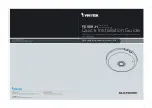
66
ASUS WLAN Card
Chapter 5
Chapter 5 - Glossary
Glossary
Direct-Sequence Spread Spectrum (for 802.11b)
Spread spectrum (broadband) uses a narrowband signal to spread the
transmission over a segment of the radio frequency band or spectrum. Direct-
sequence is a spread spectrum technique where the transmitted signal is spread
over a particular frequency range. The Space Link Wireless ASUS WLAN
Card uses Direct-Sequence Spread Spectrum (DSSS) for radio communication.
Direct-sequence systems communicate by continuously transmitting a redundant
pattern of bits called a chipping sequence. Each bit of transmitted data is mapped
into chips by the Wireless ASUS WLAN Card and rearranged into a
pseudorandom spreading code to form the chipping sequence. The chipping
sequence is combined with a transmitted data stream to produce the Wireless
ASUS WLAN Card output signal.
Wireless mobile clients receiving a direct-sequence transmission use the
spreading code to map the chips within the chipping sequence back into bits to
recreate the original data transmitted by the Wireless ASUS WLAN Card.
Intercepting and decoding a direct-sequence transmission requires a predefined
algorithm to associate the spreading code used by the transmitting Wireless
ASUS WLAN Card to the receiving wireless mobile client.
This algorithm is established by IEEE 802.11b specifications. The bit
redundancy within the chipping sequence enables the receiving wireless mobile
client to recreate the original data pattern, even if bits in the chipping sequence
are corrupted by interference. The ratio of chips per bit is called the spreading
ratio. A high spreading ratio increases the resistance of the signal to interference.
A low spreading ratio increases the bandwidth available to the user. The Wireless
ASUS WLAN Card uses a constant chip rate of 11Mchips/s for all data rates,
but uses different modulation schemes to encode more bits per chip at the
higher data rates. The Wireless ASUS WLAN Card is capable of an 11 Mbps
data transmission rate, but the coverage area is less than a 1 or 2 Mbps Wireless
ASUS WLAN Card since coverage area decreases as bandwidth increases.







































